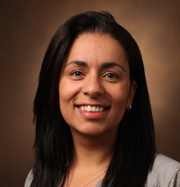Howard Hughes Medical Institute selects Vanderbilt’s Byndloss as early-career scholar Leave a comment
Source

 Mariana Byndloss, DVM, PhD
Mariana Byndloss, DVM, PhD
by Bill Snyder
The Howard Hughes Medical Institute has selected Mariana Byndloss, DVM, PhD, assistant professor of Pathology, Microbiology and Immunology at Vanderbilt University Medical Center, as one of its first Freeman Hrabowski Scholars.
HHMI, the nation’s largest private biomedical research institution, launched the roughly $1.5 billion Scholars program this year, officials said, to support “outstanding early career faculty who are committed to advancing diversity, equity and inclusion in science.”
During the next 20 years, up to 150 scholars will be selected. They each will receive up to $8.6 million over a 10-year period to support their research and “capacity to create an equitable and inclusive lab climate.” Byndloss is among the first 31 scholars announced May 9.
“Dr. Byndloss’ selection as an HHMI Scholar in an extraordinarily competitive national competition is a validation of everything we know about Mariana,” said Jennifer Pietenpol, PhD, Chief Scientific and Strategy Officer for VUMC and holder of the Brock Family Directorship in Career Development.
“Watching her scientific development at Vanderbilt University Medical Center, we have known that she’s a scientific leader with limitless potential for making breakthrough discoveries that will benefit humanity,” Pietenpol added. “Her HHMI appointment as a Freeman Hrabowski Scholar is recognition of all these things.”
“Mariana is an excellent scientist and a dynamic personality. This award is so well deserved,” added Nobel Laureate and past HHMI President Thomas Cech, PhD, a member of the VUMC Biomedical Science Advisory Board.
Byndloss, who joined the Vanderbilt faculty in 2018, is exploring how inflammation, diet, antibiotics, and other environmental factors disrupt the microbial community, also known as the “microbiome,” living in the large intestine, thereby increasing the risk for colorectal cancer, cardiovascular disease, childhood obesity, and other disorders.
She is co-director of the Vanderbilt Microbiome Innovation Center, a campus-wide effort to advance microbiome science, therapy, education, and policy through research, training and public education activities.
“It is an incredible honor to be selected as a HMMI Freeman Hrabowksi Scholar,” Byndloss said. “The support from HHMI will enable me to not only perform groundbreaking and impactful research but will also allow me to continue to mentor a diverse group of talented young scientists.”
Byndloss earned her Doctorate in Veterinary Medicine and PhD in Veterinary Sciences from the Universidade Federal de Minas Gerais in her native Brazil. Before her arrival at Vanderbilt, she completed a postdoctoral fellowship at the University of California, Davis.
She has co-authored more than 70 scientific publications, some in high-impact journals including Science and Nature. In 2021 and 2022, she was identified as a “Highly Cited Researcher” by the global analytics firm Clarivate.
In 2020, Byndloss received a two-year, $200,000 V Scholar Award from the V Foundation for Cancer Research to support studies of the links between obesity, the gut microbiome, and colorectal cancer.
She was a finalist for the inaugural NOSTER & Science Microbiome Prize, sponsored by NOSTER, a new brand of pharmaceutical and nutritional products, and by the journal Science to recognize innovative microbiome research by young investigators.
Last year Byndloss was named a Pew Scholar in the Biomedical Sciences by the Pew Charitable Trusts, which — according to the Pew website — provides funding to young investigators “of outstanding promise in science relevant to the advancement of human health.”
HHMI’s Scholars Program is named for Freeman A. Hrabowski III, PhD, the former president of the University of Maryland, Baltimore County, and a leading advocate for increasing the number of scientists, engineers and physicians from underrepresented and minority backgrounds.
“For academic science to thrive in an increasingly diverse world, we need to attract and support scientists from a wide variety of racial and ethnic backgrounds,” HHMI president Erin O’Shea, PhD, said in announcing the program. “Early career faculty play a key role because they are the leaders of tomorrow.”


